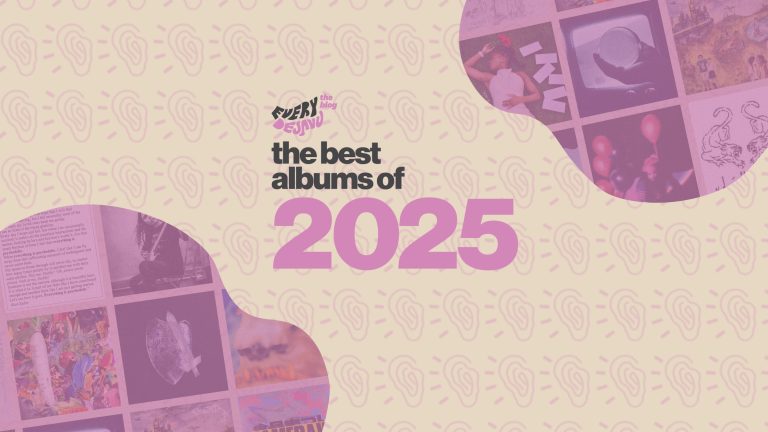Jazz and hip-hop have always shared a profound connection, the former directly influencing hip-hop’s Golden Age in the 90s with artists like A Tribe Called Quest, The Roots, and De La Soul guiding this distinct wave. Virginia Beach artist (a.t.c.) now rides on it, too. His debut EP, bluendgrene, is a crucial representation of jazz and hip-hop’s consanguinity, approaching its present-day exertion while resisting modernizing the traditional ethos of both genres.
“Q&a.” boldly sets the scene with the soulful wail of a saxophone weaving through textured jazz drums, two voices in a brief opaque conversation. One imagines: a small diner, a man in a fedora, colors swirling in electromagnetic bands of monochrome, a swing band in the corner. “How am I not myself?” echoes eerily as the jazz carries on. (a.t.c.) introspects, his voice shifting from confused to exasperated to indignant, finally desperation, cornered into a black hole by the cosmic weight of identity disorientation.
Tonally, this sense of dislocation extends to the EP, which sounds rooted in an era of classic Lincolns and Basquiat-esque murals—an aesthetic shown in the intro track. Thematically, it approaches universal, timeless issues. The first (a.t.c.) describes through submerging in the fictional character of Llewis Davis, a tortured artist experiencing the creative state through a soft, dull lens. “Llewis Davis” opens with a waltz time signature-like rhythm led by daunting drums, overpowered by stronger sentiments: “Inspiration? Nah, my days’ been complacent.” (a.t.c.) embraces the frustration of being tied to a tired trope through self-deprecation, “I talk to God but she rarely give me plain advice / Probably ‘cause my problem seems smaller than a grain of rice.” The beat-down resignation from a history of “bottling trauma” lends a gospel note of sadness to the song that lacks its harmonical revival and instead ends with a hysterical monologue sounding stripped from an old VHS recording.
“Sliding Glass Doors” emerges from this rubble of a monumental identity collapse, and sees (a.t.c.) clawing his way from the bottom of a deep hole, reaching for the green halo of revival in the arms of acceptance. A bass-heavy, laid-back swing, with a soulful loop soundtracks his murmuration, further coloring a bluesy state. But he is fully aware of his melancholy, admitting, “I threw the hammer through the sliding glass door.” It’s a compelling line that truly conceptualizes his fragile emotion and perseverance despite the struggle to break through to freedom.
The beat then climbs a notch higher, seeping in a bit of optimism with “Late Bloomer.” With its light chord progressions, snare clicks, and experimental flute, the song melds in a feel-good pattern. Dissecting his complicity in the uninspired state of his professional and personal life, he confesses: “I’m just settling, I blame it on depression / And that’s a blatant misdirection.” The strive towards accountability and ripping the protective blanket of depression inspires and builds the tone to an even more sonically uplifting follow up, “See You Later.” With an avant-garde lo-fi, be-bop textured beat, the track is a fatalist approach to life, sinking deeper in a muddy pool of doom, a feeling he tries to universalize: “Trying to find something to save us.” It’s a way of acknowledging a sonder experience, as though he can validate his experience and hide behind the veil of generalization. “I don’t think I felt at home even once / I walk around with a head full of fog,” he raps. You can’t help but wonder if the beat is particularly uppity to distract the listener from the stark contrast in the lyrics.
But what’s even more fluid than (a.t.c)’s style as he bounces between shades of melancholy is his approach to the blues. In a track like “Maintain” he marches with indefatigable precision to “Adapt to change / Keep hope and maintain” over a haunting yet booming percussive landscape which leads into the rhythmically similar tune, “Fleur-de-lis,” giving room for him, for once, to be juvenile, kicking off with a petty dig at his ex. Increasingly comical is the claim later on: “I don’t make snide remarks, I don’t seek revenge.” The song takes the project on an upward trajectory, climbing from the hollowness of a grim, cold room to the sunny haze of a surrealist scene: “…I’ll be on the beach / good music, good women, all I really need.”
They say joy is an act of deliberacy, even rebellion, in a world that constantly seeks its annihilation. So when (a.t.c) raps on “Up so Late / Just to Feel Good”: “I might drop a couple plans just to dance in the rain,” he depicts a stubborn sense of riot which rather than trivializes a mental illness, presents an alternative road. Merely acknowledging this other path, even further magnifies its presence. There’s a distinct change to the beat and tonality of the entire piece built subtly from each track, only to be fully marveled through a zoomed-out view. On this track, you can hear a smile through every line, layered over a slow-moving bassline, silvery vocal runs accentuating the melody.
Even though the tempo changes on “No Rollover Minutes,” orchestratic with deep resonant bass of repetitive pulse playing in tune with heavy, grounded piano notes and stabbing synths, his approach to his experience doesn’t change. (a.t.c.) implies the futility of sadness despite its insistence on the human experience: “The clock keeps ticking / Even if your soul’s in prison” and posits the cliche: “Life is short.” Too short to be weighed by what he considers redundant.
The major critique of bluendgrene is its linear progression from blue, representing despondency, to green, symbolizing revival and rebirth, painting a misleading, unachievable approach to healing. This aside, bluendgrene is such a vulnerable, bleak work earning (a.t.c.) plaudits for his courage to transform the lifeless manifestations of his dark psyche into honest art. He adds to his oeuvre of somber music that isn’t afraid to observe both ends of the spectrum, establishing himself as an artist who, despite the complacency of clinging to depression as a one-size-fits-all diagnosis for artistic and personal struggles, faces his demons head-on, seeks, rather, what could be beyond a dreary existence.





